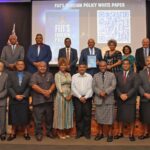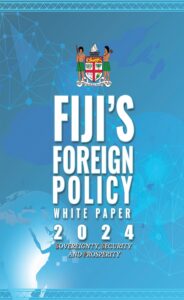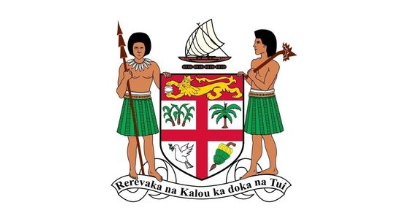
ESCAP Regional Dialogue on Ocean based Climate Action, Bangkok, Thailand
21/09/2024
Prime Minister Rabuka launches Fiji’s Foreign Policy White Paper
24/09/2024Published On: 24/09/2024
Na Turaga na i Talatala, Reverend William Powell
Honourable Cabinet Ministers
Honourable Members of Parliament
Members of the Diplomatic Corp
Permanent Secretaries and Senior Government Officials
Distinguished Former Fijian diplomats
Members of the Academia
Members of the Media
Ladies and Gentlemen
Ni sa bula vinaka and a very good afternoon to you all.
I wish to begin by first acknowledging the traditional owners of the land of which we stand today.
Ki na Vanua ‘o Nadonumai, vua na Turaga na Tui Suva.
I pay my respects to their Chiefs, both past and present, as well as emerging leaders and members of the Vanua o’ Nadonumai who may be present here this morning.
I am pleased to be here this morning to officiate a momentous occasion for us as a country.
One of the crucial tasks of the Coalition Government since assuming office was to establish strong foundations to give Fiji and its people clarity, direction and certainty. The Foreign Policy White paper is a key part of this effort.
When one hears the term Foreign Policy White Paper, what does it mean?
Let me divulge!
I remember vividly my first most international engagement in my career as a Prime Minister in 1992 to the Rio Earth Summit – having to sit across from world leaders and realise that our own words and actions on the global state shapes the future of our people.
That day it became more apparent to me the deep importance of a clear and strategic policy – one that reflects not only our nation’s values but our place in the world.
Today, we are launching this foreign policy white paper as a commitment to further securing our place in the global community, ensuring a prosperous and secure future for every Fijian.
Foreign Policy White Paper
Distinguished Guests, Ladies and Gentlemen, the Foreign Policy White paper is Fiji’s first white paper that sets out the path to meet the complex foreign policy challenges we face as a nation.
It is the definitive statement of the Government’s foreign policy and Fiji’s place in the world.
As little boy, growing up in the village, transitioning to the urban center, through my education years right up to my employment, I’ve seen how much our history, our geography, and our sense of identity have been influenced by our wider relationships with the global world.
Fiji’s culture of openness, respect for diversity, and resilience have shaped the way in which we connect and engage with the rest of the world.
Distinguished Guests, Ladies and Gentlemen, I am pleased to note that the White Paper explains just how Fiji sees itself and how we wish to present ourselves to the world.
It outlines the Government’s foreign policy initiatives, especially the promotion of the Ocean of Peace which is the single most significant contribution that Fiji can make to peace and security in our neighbourhood and the broader Indo-Pacific region.
The White Paper reaffirms the central position of the Pacific region in our foreign policy calculations.
It makes clear that in all we do in foreign policy we will put the Pacific family first!
The foundation of this White Paper is a whole-of-nation approach that integrates all elements of policy – domestic and external, and recognises that our security and prosperity ultimately depend on a clear-eyed view of our national interests and values and how best to advance them.
The Foreign Policy White Paper sits alongside Fiji’s National Development Plan and the proposed response to the current National Security and Defence Review as the foundations of the Government’s strategy to advance Fiji’s strategic and economic interests and strengthen its social cohesion.
This is a headline document. It is not a checklist of all we are doing in our foreign policy. Nor is it a catalogue of all our bilateral and multilateral relationships and activities.
Instead, it sets out the underlying principles of Fiji’s foreign policy, our overarching objectives, our broad priorities and the way in which domestic and foreign policy are closely intertwined. It is a narrative of where we wish to go and how to get there.
What follows builds on the three interconnecting themes of Fiji’s foreign policy: sovereignty, security and prosperity. These are the traditional pillars of foreign policy but the context in which we must pursue them has profoundly changed.
The test of a nation’s foreign policy is its ability to recognise change and adapt to it.
The outlook for our region and globally is today more uncertain than at any time since Fiji came to independence. We are in the midst of what is likely to be a long transition from the US-led liberal international order to a more multipolar world.
The old liberal international order, from which Fiji was a beneficiary, and which saw an unprecedented level of global cooperation and economic interdependence, is gone.
In its place is a complicated competition for primacy between the US and China, played out most sharply in our Indo-Pacific region. At its most basic, China aspires to become the predominant power in the region and the US is determined to hold on to its pre-eminence.
How this competition will play out is an open question. The stakes are high. There are significant risks of miscalculation. A policy of de-risking US-China economic relations could well still spill over into a decoupling of the two economies at the heart of global growth.
In the Indo-Pacific, the project of building region-wide institutions has come to an abrupt halt; the victim of US-China strategic competition. These institutions remain in place but have a stalled agenda and little momentum.
Just as the geopolitical order is shifting, so too is the international economic order.
Over the past decade, global trade has grown by over 40 percent creating millions of jobs, and lifting people out of poverty. However, due to geopolitical tensions, global trade has contracted by 5 percent for last year alone – threatening these gains!
It is apparent that Protectionism is on the rise. Supply chains are being reorganised. Self-reliance has acquired a renewed appeal. Open economies are considered a vulnerability not an asset. National security concerns increasingly shape economic policy.
This is the context of uncertainty and risk within which Fiji must navigate its foreign policy.
There is much work ahead, one that will safeguard Fiji’s access to markets and investments, ensuring the prosperity of our people.
To conclude, I wish to thank all officials, under the leadership of the Permanent Secretary for Foreign Affairs, who have contributed to the preparation of this document.
In so doing I would like to:
-acknowledge the wise input of the Reference Group which helped guide its preparation.
-thank the White Paper’s principal drafter, Mr Peter Varghese AO.
-acknowledge with appreciation the Australian High Commissioner, His Excellency Ewen McDonald and the Australian Government for the technical and financial support through our renewed and elevated Vuvale partnership.
Distinguished Guests, Ladies and Gentlemen, as I look back, I see a world where our future generation will inherit the decisions we make today.
I am confident that this foreign policy white paper is not just any other document – but a roadmap that ensures that our children will live in a country that is secure, and prosperous and respected on the global stage.
Vinaka vakalevu and God Bless Fiji.




